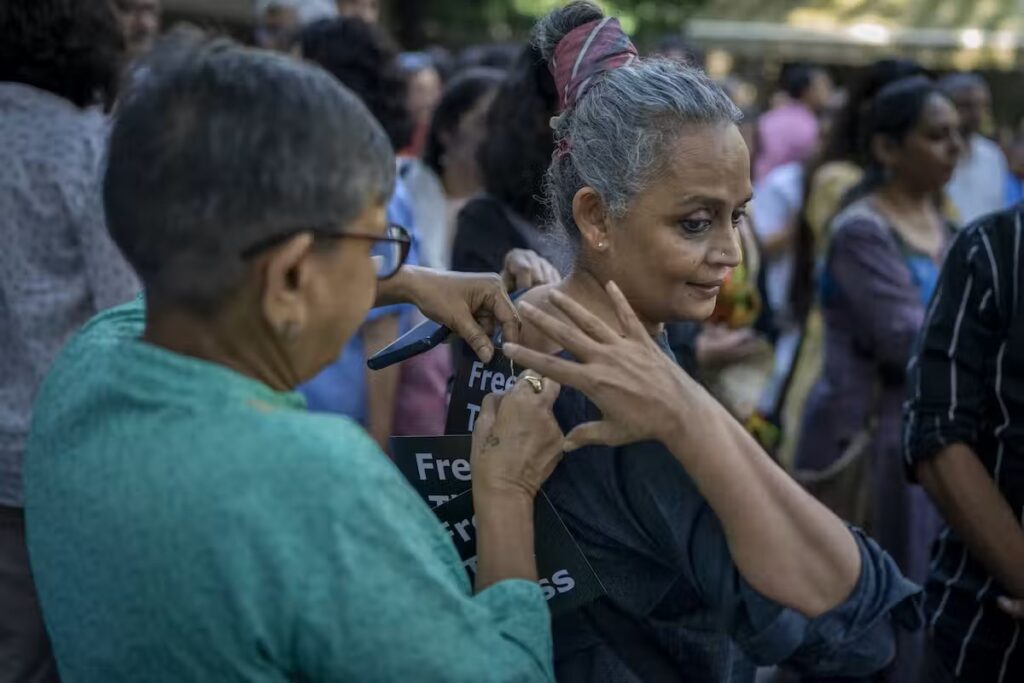Why India Has No Interest In Serving As A Pawn Of The West
Nov 5, 2023 | Pratirodh Bureau
A journalist pins a small Free the Press placard on the dress of writer and activist Arundhati Roy during a protest at the Press Club of India in New Delhi on Oct. 4, 2023. Police arrested her a few days later for comments she made in 2010 (AP Photo/Altaf Qadri)
Canada’s deepening divide with India following its accusation that the Indian government was responsible for the murder of Canadian citizen Hardeep Singh Nijjar has revealed a cynical truth: the West’s interest in democracy and rules-based international order is largely empty rhetoric.
Canada’s western allies have offered some support in its confrontation with India. However, this support is extremely limited. India is too important to American efforts to contain China.
India understands this and is taking full advantage of its position in this ongoing geopolitical chess game by getting what it can from the West while keeping a clear focus on its own interests.
India is a regional rival of China. It may have passed China as the world’s most populous country and is, by purchasing power parity, the world’s third largest economy.
The United States is trying to redirect global resources and supply chains from China to India. Supposedly, India is “safe” because it shares “democratic values” with the West.
Modi regime
However, India’s so-called liberal democracy has been severely damaged by the Hindu-supremacist policies of the Narendra Modi regime.
In modern India, religious minorities, especially Muslims, are regularly victims of mob violence, including lynching and sexual assault.
A rabid nationalist media pumps up government policies. Critical journalists are brutalized and silenced. The judiciary and parliament have been cowed.
Indian author Arundhati Roy argues that India is well on its way to becoming a fully fascist state. Roy was recently charged by the Modi regime for supposedly “provocative” statements she made in 2010.
The western world knows all of this, but its actions towards India aren’t motivated by “shared values.” The West, led by the U.S., is driven only by the desire to contain China.
India has rejected Canada’s accusations, but has also flagged western hypocrisy. Indian MP Shashi Tharoor has alleged the U.S. and Israel are the “two foremost practitioners of extra-territorial assassinations in the past 25 years.” American drone warfare has killed thousands of people the U.S. accuses of terrorism and thousands of innocent bystanders in the Global South.
India may be following the West’s lead, but on a much smaller scale. Also, it allegedly acted in a western state, which seemingly expect to be exempt from the kind of violence they have unleashed on the Global South.
Not An American Pawn
India is happy to accept western economic, military and technological support to help it close its enormous gaps in wealth, infrastructure and overall development with China. The West, meantime, needs India to maintain its global domination.
But India has no more interest in perpetuating western dominance of the global system than China does. It is not an American pawn.
India is pursuing its own interests, as its continuing relationship with Russia indicates.
India and China have a major border dispute and are militarily at odds. They view each other with mutual suspicion and, often, contempt.
But they understand that they will be neighbours forever and their relationship can be mutually beneficial if they can find diplomatic resolutions to their conflicts. This may be easier said than done, but the two countries have improved relations in the past and enjoy a growing economic relationship today.
Most Indians accept that making an active enemy of China is not in India’s best interests.
The more aggressive the U.S. becomes towards China, the more leverage it gives to India to use against both the Americans and the Chinese. India can extract benefits from the U.S.; simultaneously, American aggression provides China with incentives to improve its relations with India.
Choosing A Side
But there is a point — perhaps fast approaching — at which regional states will feel forced to make a choice between China or the U.S. There’s a limit to how far both sides can be played off against the other.
Tensions between India and China benefit U.S. interests. If India and China resolve their differences and choose to work together — or, at least, not to work against each other — it would complicate those interests. As unlikely as this may seem now, harmonious relations between China and India are a real long-term possibility.
India is far from posing a threat to American power the way China is now. Nonetheless, if the U.S. succeeds in elevating India at China’s expense, it will eventually have to contend with challenges from India. It’s already clear that India doesn’t see itself as a western subordinate and has its own regional aspirations.
India’s alleged murder of a Canadian citizen may be a taste of how India will handle its relations with the West as it rises in power. India will be demanding privileges the West extends to itself and its allies, for whom “rules-based international order” is a meaningless facade.
Canada has asked India to co-operate in its investigation of Nijjar’s murder. The investigation will probably go nowhere and be quietly buried. There are suspicions that India may be threatening other Sikh activists and may have committed another murder in the U.K.
India has recently eased some visa restrictions on Canadians even as it has expelled 41 Canadian diplomats, threatening to revoke their diplomatic immunity.
India will walk away untouched from its spat with Canada. It is too important to western strategies against China. But India has its own game to play and that does not necessarily accord with what the West wants.
(This article is republished from The Conversation under a Creative Commons license. Read the original article here)
